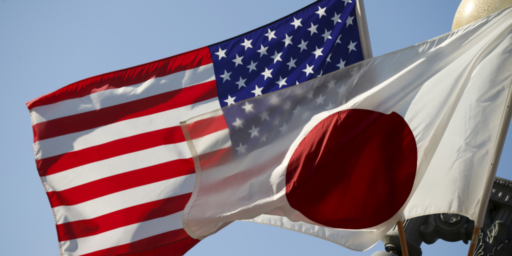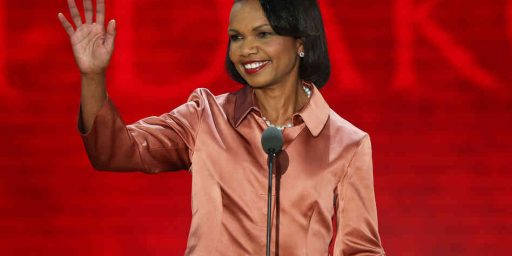Germany, Japan, India, and Brazil Seeking UN Security Council Seats
Japan, 3 Others Drop Veto Demand in Bid to Win UN Council Seats (Bloomberg)
Japan, Germany, India and Brazil will drop a demand that new permanent members of the United Nations Security Council have veto rights in a renewed bid to win seats on the UN’s most powerful committee, Japan’s government said. “We are working in unison, and we agree on the need to win as much support as possible from other countries,” Japanese Prime Minister Junichiro Koizumi told reporters in Tokyo today.
The latest proposals, which call for new permanent members to waive the right to veto proposals for 15 years, come as the group, which dubs itself the G4, struggles to win support for changes. The four nations want to add six new permanent seats to the five held by the U.S., China, Russia, the U.K. and France and to expand the number of non-permanent members, which serve two-year terms, to 14 from 10. Any of the five existing permanent members can block proposals by exercising their vetoes.
China may halt an expansion, the China Daily said on June 3, citing the nation’ foreign ministry. The U.S. opposes Germany’s bid for a permanent seat, the New York Times reported today.
Japan, the second biggest financial contributor to the UN, has made securing permanent membership on the Security Council the central goal of its international diplomacy this year, which marks the 60th anniversary of the end of World War II. It also wants the UN to drop its designation of Japan as an “enemy state.”
US Wary of German Security Council Bid (Deutsche Welle)
Washington has thrown a wrench into Berlin’s aspirations of becoming a permanent member of the UN Security Council, arguing that the expansion of the body is not its top reform priority. At a joint press conference with German Foreign Minister Joschka Fischer on Wednesday, US Secretary of State Condoleezza Rice held back on endorsing Germany’s bid to become a permanent member of the UN Security Council, arguing that other UN reforms such as streamlining management were more important than the expansion of the top decision-making body from the current 15 members to 25, as proposed by Germany, Japan, India and Brazil.
While generally acknowledging the need of a reform, Rice, however, said the United States was looking closely at the various proposals to have “a sober and reflective discussion” aimed at achieving “the broadest possible consensus on how to move forward on what would be a very fundamental change. “And so our plan at this point is to try, through the appropriate channels at the UN, the presidency of the General Assembly and so forth, to promote that dialogue on what it is that we are trying to achieve in Security Council reform as well as in the broader UN reform,” she said.
[…]
“The only country that we have said unequivocally that we support is Japan, having to do with Japan’s special role in the UN and support for the UN,” Rice said. “But obviously, we are going to look at how to think about UN Security Council expansion within the context of… broader reforms.”
I agree that Japan has the best case for Permanent Member status of any state not on the Council, simply owing to its economic power and the fact that it’s the UN’s number two contributor. Dropping the “enemy state” designator, certainly, is a no brainer. Indeed, I had forgotten that it was there.
A case can be made for all of the petitioners, really, given their stature as major powers (Germany and India) or as the most logical choice for an unrepresented region (Brazil). If we were coming up with a list of Permanent Members from scratch, Japan, Germany, and India would be more likely inclusions than Russia, perhaps even France.
The problem, as I’ve argued before, is that expanding the membership of the Council will make it even more unwieldy than it is now. Further, opening Pandora’s Box will be a nightmare. Once the precedent is set that the original charter members are not set in stone, others will petition. Why not an African representative? Countries will naturally compare themselves to the least powerful current member and argue that they are at least as deserving.






I think India also has a pretty good case, and they would be a good country to bring in, given their population and their region.
I don’t think Germany should get a seat, especially since the EU thing doesn’t seem to be totally dead, but my opinion is that if the EU goes through, and UK and France both keep their seats, then we should get to get seats for California and Texas too.
South Africa would be the best African representative. It certainly managed to doff white-supremacy more gracefully than Zimbabwe did. It’s still democratic, only tolerably corrupt and modern – certainly Africa’s most functional state. Not a perfect state by any means (crime e.g.), but if the rest of Africa looked more like South Africa than it does, the continent would be vastly better off.
I’ve written about this pretty extensively. My solution: have explicit membership requirements. Germany can’t meet one of the obvious requirements which is percent of GDP devoted to military expenditures. Neither does Japan.
The Security Council is for, well, security. And I seen no particular reason for security consumers to have permanent seats on it. Perhaps they should start an Insecurity Council.
Which is the best political setting to bring this planet into a new millenium?
There are forces in different part of the world that need to be brought into the UN, and there are issues that need to be dicussed and dealed with within this body for a global community. I hope the new security council will be able to face these issues.
And some more membership requirements…: gobal pollution, age of civilisation, abilty to perform a democratic election and ignorance of the national government!